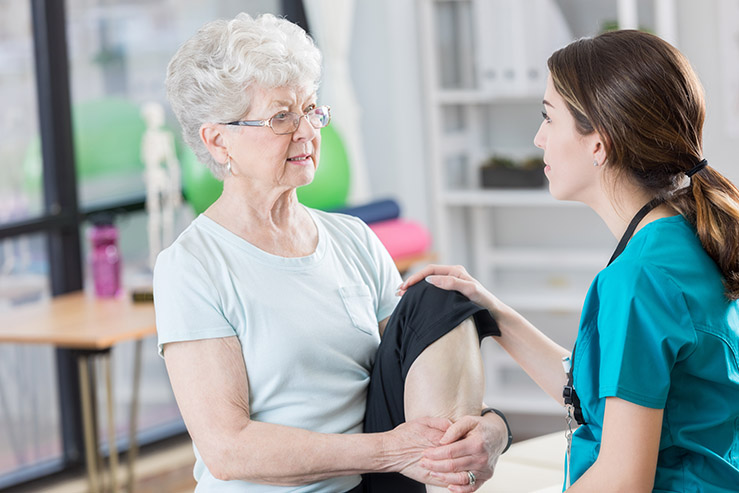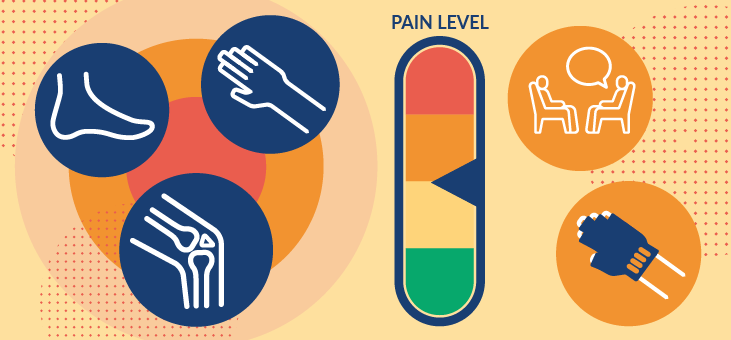
Around 400,000 people in the UK live with rheumatoid arthritis. Most are over 40 but children and young people can also have the condition, with women three times more likely to be affected than men.
Rheumatoid arthritis is an autoimmune disease in which the body’s immune system attacks healthy tissue, mainly the joints, causing inflammation, pain, swelling and stiffness. Fatigue is also a significant problem for more than half of people with rheumatoid arthritis and can be an enduring challenge in their lives.
There is no cure for inflammatory arthritis, although there are now many treatments such as biologic therapies that can help to stop joint damage and successfully manage the symptoms. However, chronic pain and fatigue can still be difficult to manage even if the inflammation in the joints is fully controlled by these types of medications.
There are many types of arthritis but the two most common in the UK are:
- Osteoarthritis – where the cartilage lining of the joints, mainly in the hands, spine, knees and hips, starts to thin out and roughen, causing the tendons and ligaments to work harder. This causes swelling and the formation of bony spurs, making the joint stiff and painful.
- Rheumatoid arthritis – where the immune system attacks healthy cells in the joints, often first in outer covering of the joint (the synovium). This can cause swelling and a change in the joint’s shape, and can cause the bone and cartilage to break down.
The impact of chronic pain
Dealing with constant pain takes a toll. An NIHR-funded study in 2021 found that people with rheumatoid arthritis were more likely to self-harm than those without an inflammatory condition. The researchers analysed the largest primary care dataset in the UK between 1990 and 2016. They looked at data from patients with osteoarthritis, rheumatoid arthritis, fibromyalgia (where people feel pain all over the body) and ankylosing spondylitis (which usually causes back pain and stiffness, swelling, pain and fatigue) and compared it with data from patients without these four conditions. The researchers found that fibromyalgia and rheumatoid arthritis both significantly increased the risk of patients self-harming.
Study author, Dr James Prior from Keele University, said:
“This research puts the mental health needs of people with rheumatic conditions like fibromyalgia and rheumatoid arthritis on clinicians’ radar. Unless they are having a particular problem, these people may not be seeing a doctor on a regular basis. That makes it more important for GPs to address their mental health early on.”

Pain relief in a glove
Sometimes simple steps can help to reduce pain for people with rheumatoid arthritis. An NIHR-funded study in England and Scotland in 2021 found that ordinary fingerless gloves provided as many benefits to patients as special arthritis gloves which cost considerably more. The special arthritis gloves have been prescribed on the NHS since the 1980s, but only last four months, with patients covering the cost of replacements.
The researchers recruited 163 patients who had pain in their hands that affected their mobility and how well they slept. Half of patients were given the special arthritis gloves that are quite tight-fitting. The other half were given loose, fingerless gloves that were fitted by an occupational therapist. The patients’ pain levels, hand function and sleep patterns were assessed both before the trial started and after wearing the gloves both during the day and at night for 12 weeks.
Both groups expressed similar views about the gloves. One participant with loose-fitting gloves said:
“They were fab. They actually made my joints warm and… as soon as your joints get a bit warmer, the pain actually eases.”
Overall, nearly three quarters of people in both groups said they found the gloves beneficial and would continue to wear them, but there were no added benefits from the specialist gloves.
Ways to quantify pain
Pain and fatigue are difficult to assess objectively, to help researchers determine what treatments for rheumatoid arthritis work best and which patients are at most risk. Two studies are looking at this issue: one using a new questionnaire for patients to complete and the other looking at various ways to assess pain levels in patients on two different treatments.
Researchers at the University of Nottingham are being funded by the charity Versus Arthritis, and the pharmaceutical company Pfizer, to assess a new questionnaire called ‘Central Aspects of Pain in Rheumatoid Arthritis’ or CAP-RA. Patients who attend a rheumatology clinic in the Midlands will be asked to fill out the questionnaire and undergo other investigations, such as ultrasound, sensory tests and blood tests to check inflammation levels. They will provide a weekly pain and fatigue report over the following three months and then fill out the questionnaire and undergo the tests again. The researchers hope this will help them determine how accurately the questionnaire can measure current pain levels or predict which patients are likely to develop pain and fatigue.
A similar study in London, funded by St George’s University, is looking to compare different means of measuring pain in patients who are being treated with one of two biologic therapies, either abatacept – this works by suppressing an over active immune system – or adalimumab, which reduces excess inflammation. The researchers will ask patients to rate their pain levels on a visual scale (similar to a Lickert scale) and patients will also undergo sensory tests and pain pressure threshold tests, with these compared to tests for inflammatory markers in the blood. The aim is both to look at pain levels in patients undergoing these different treatments, and also to compare the levels of pain reported by patients to more objective evaluations.
Therapy to help fatigue
Fatigue can be one of the most difficult symptoms to cope with for people with rheumatoid arthritis and an NIHR-funded study in 2020 found that group cognitive behavioural courses may help. The research recruited patients with rheumatoid arthritis across South-west England and Wales, with half receiving a one-to-one consultation and a booklet on managing fatigue and the other half undertaking a seven-week cognitive behavioural therapy (CBT) course as well. The patients who had the CBT sessions, which were delivered by rheumatology nurses and occupational therapists rather than a psychologist, saw significantly more improvement in their fatigue levels. There can often be longer waits to see a psychologist, so enabling these courses to be run by other healthcare professionals would mean they could be accessed by more people.
Professor Sarah Ryan, from the Midlands Partnership NHS Foundation Trust, said of the research:
“Current provision to address fatigue is poor. This provides healthcare providers with a low cost and effective treatment option for managing fatigue. It also shows that fatigue can be addressed and managed within the rheumatology team.”
How you can get involved with research
Sign up to Be Part of Research to take part in a range of health and care research. You can also visit our 'How to take part' page to find out more about research trials that are happening now and in the future.
Our 'what happens on a study' page provides more information on how trials work. And if taking part in a study doesn’t feel right at the moment, there are other ways to get involved in research.
Related articles
- Stopping biological drugs for rheumatoid arthritis can lead to twice the relapse rate (nihr.ac.uk)
- Existing drugs for rheumatoid arthritis may also improve associated fatigue (nihr.ac.uk)
- Hand strengthening and stretching for people with rheumatoid arthritis: online training helps therapists deliver an exercise programme (nihr.ac.uk)




